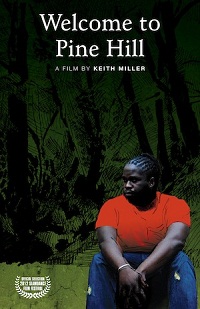Warren Cantrell reviews a new indie film from the 2012 Seattle International Film Festival:
 It’s usually hard for a critic to use a heavy hand when reviewing the work of an innovative filmmaker, especially one promoting their first full-length feature. One of the most common criticisms of American pictures for the last quarter century has revolved around a dearth of innovation: a wide-scale originality drought.
It’s usually hard for a critic to use a heavy hand when reviewing the work of an innovative filmmaker, especially one promoting their first full-length feature. One of the most common criticisms of American pictures for the last quarter century has revolved around a dearth of innovation: a wide-scale originality drought.
At a time when the most celebrated films are either cross-medium adaptations or remakes, an inventive breath of fresh air is not something one should be quick to sneeze at. Yet as every inventor will tell you, nothing worthwhile comes together on the first try, and as good as an idea is, it is only as fruitful as the time spent developing its potential.
Welcome to Pine Hill is better than a first, or even second try, yet it still feels like it is a few versions away from full maturity. Writer-director Keith Miller met the film’s star, Shannon Harper, when the two got into a sidewalk argument over ownership of a dog, an encounter that both men resurrect and re-live in a scene that opens the picture. During this encounter, Shannon explains that he used to be a thug, a guy who would have simply taken the dog, not discuss the matter, yet he’s a changed man now.
This is clear after the two come to a peaceable agreement over the dog, and even more obvious in the next scene, when the audience sees Shannon in an office, dressed in a wholly appropriate business-casual ensemble one would expect of a Manhattan office-ant. Indeed, that’s exactly what Shannon is, for he’s pulled himself up out of the street game, and now works as an auto insurance claims adjuster.
 The film’s universe is a surprisingly familiar one. The director built the film, which is really more of a floating non-narrative, around the physical and largely silent presence of Shannon Harper, a man without any acting experience who mostly plays himself in the picture (he retains his name for the role). Early in the film, Shannon receives a devastating medical diagnosis (this reviewer doesn’t want to ruin anything, but let’s just say it is bad, and rhymes with “VERMINAL BLANCER”). Already a fairly meditative picture up to this point, Welcome to Pine Hill moves into a very unique place after Shannon receives this bombshell, for rather than a predictable bucket-list adventure, or maybe even a cathartic reunion with some of the ghosts from his past, the movie settles back, and lets the sudden, dizzying impact of the moment seep in.
The film’s universe is a surprisingly familiar one. The director built the film, which is really more of a floating non-narrative, around the physical and largely silent presence of Shannon Harper, a man without any acting experience who mostly plays himself in the picture (he retains his name for the role). Early in the film, Shannon receives a devastating medical diagnosis (this reviewer doesn’t want to ruin anything, but let’s just say it is bad, and rhymes with “VERMINAL BLANCER”). Already a fairly meditative picture up to this point, Welcome to Pine Hill moves into a very unique place after Shannon receives this bombshell, for rather than a predictable bucket-list adventure, or maybe even a cathartic reunion with some of the ghosts from his past, the movie settles back, and lets the sudden, dizzying impact of the moment seep in.
In making this film, director Keith Miller uses a lot of improvisation and a mixture of non-actors with professionals to lend his picture a raw, genuine flavor. Some of the things one might expect are here, such as a meeting between Shannon and his old drug-dealing crew, and another visit to see his mother, who clearly has her doubts about the alleged reformation of her son. During the latter scene, the two sit in the woman’s kitchen and discuss what it means to trust somebody, to love them, and most importantly, how difficult and simultaneously vital it is to lead an honest life.
 At this moment the film could have easily devolved into a retread of the recent Seth Rogen/Joseph Gordon-Levitt flick 50/50, yet instead of making this a picture about what it means to face one’s mortality in the presence of a strong community, Welcome to Pine Hill goes the other direction. Shannon doesn’t tell any of his family or friends that he’s sick, mainly because he doesn’t really have anyone in his life that seems worthy of such news. It is a bold choice for the narrative, and one that gives a very distinctive slant to a standardized hero’s journey most have already seen played out dozens of times before.
At this moment the film could have easily devolved into a retread of the recent Seth Rogen/Joseph Gordon-Levitt flick 50/50, yet instead of making this a picture about what it means to face one’s mortality in the presence of a strong community, Welcome to Pine Hill goes the other direction. Shannon doesn’t tell any of his family or friends that he’s sick, mainly because he doesn’t really have anyone in his life that seems worthy of such news. It is a bold choice for the narrative, and one that gives a very distinctive slant to a standardized hero’s journey most have already seen played out dozens of times before.
An internalized, meditative journey through maybe the darkest, most terrifying moment in any person’s life (learning you’re going to die…soon), Miller pieces his movie together by absorbing Shannon’s performance via a series of long, mostly-silent takes. These are broken up by sporadic dialogue exchanges, ones that give the picture just enough juice to continue forward, yet never establish any real sense of where the film is going, or why Shannon is headed there.
And that’s the problem. As a thoughtful, introspective journey into a man’s soul, Welcome to Pine Hill is wonderfully successful, yet as a coherent picture with a complete, satisfying arc, it comes up decidedly short. While the movie provides a lot of character ambiance and connections to the evolving mood of Shannon, it doesn’t let the audience in on the man’s motivations, or how he feels about what’s going on in his life.
 Shannon Harper acts as the picture’s anchor, for this inexperienced “amateur” has all the silent gravitas of Benicio del Toro or Javier Bardem, and keeps the film going at times when it seems to have sputtered out completely. It’s clear that the Shannon character wants to deal with the crisis, and comes close to opening up when chatting aimlessly with a cabbie who doesn’t understand English, yet the movie never gives any insight into Shannon’s true feelings. Although it’s entirely fair (nay, admirable) to make a film about a character dealing with his mortality without any half-assed monologues or arguments with God, if the movie endeavors to tell that story mostly without words, then it ought to create a symbolically rich universe to help tell that tale.
Shannon Harper acts as the picture’s anchor, for this inexperienced “amateur” has all the silent gravitas of Benicio del Toro or Javier Bardem, and keeps the film going at times when it seems to have sputtered out completely. It’s clear that the Shannon character wants to deal with the crisis, and comes close to opening up when chatting aimlessly with a cabbie who doesn’t understand English, yet the movie never gives any insight into Shannon’s true feelings. Although it’s entirely fair (nay, admirable) to make a film about a character dealing with his mortality without any half-assed monologues or arguments with God, if the movie endeavors to tell that story mostly without words, then it ought to create a symbolically rich universe to help tell that tale.
It’s never really clear why Shannon decides to go to the Catskills as a part of his coping process, for while it’s an understandable reaction some would find appealing, Welcome to Pine Hill never really establishes why this is important or meaningful for Shannon. This is a consistent tripping point for the picture, which is currently playing at this year’s S.I.F.F., for the film is ambitious enough to take a thoughtful journey, yet never quite works out the math needed to support the logistics of that endeavor.





Comments on this entry are closed.